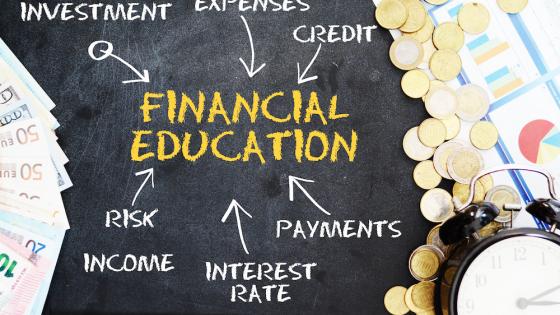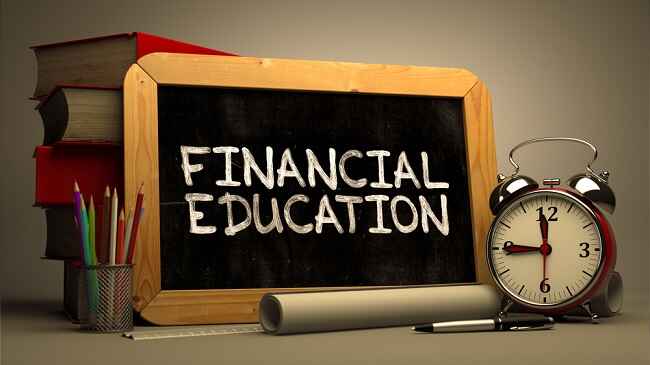Key Components of Financial Education, Benefits of Financial Literacy, Methods for Improving Financial Literacy, What is the use of financial education?, How to build your Financial Skill.
Introduction
In today’s fast-paced world, where financial decisions carry profound consequences, the importance of financial literacy and education cannot be overstated. From managing everyday expenses to making long-term investment choices, being financially literate is a vital skill that empowers individuals to take control of their financial well-being. This article aims to shed light on the significance of financial literacy and education, providing insights into its benefits, methods, and strategies.

1. Understanding Financial Literacy
Defining Financial Literacy:Financial literacy refers to the ability to comprehend and manage various financial aspects effectively. It involves understanding concepts like budgeting, saving, investing, credit management, and retirement planning.
The Impact of Financial Literacy:Financially literate individuals make informed decisions, avoid unnecessary debt, and plan for the future. They are more likely to achieve their financial goals and weather economic uncertainties.
2. The Need for Financial Education
Navigating Complex Financial Landscape:The modern financial landscape is intricate, with numerous investment options, credit products, and retirement plans. Without proper education, individuals can feel overwhelmed.
Bridging the Gap:Many individuals lack essential financial knowledge due to inadequate education. Bridging this knowledge gap is crucial for economic well-being.
3. Benefits of Financial Literacy

Financial literacy empowers individuals to take charge of their finances. With knowledge, they can confidently manage their money and make decisions aligned with their goals.
Better Decision-Making:Financially literate individuals can evaluate financial opportunities, such as investments, critically. This reduces the risk of falling for scams or making poor choices.
Debt Management:Understanding credit and debt allows individuals to manage debt effectively, avoiding the pitfalls of excessive borrowing.
4. Key Components of Financial Education
Budgeting and Expense Tracking:Understanding how to create and manage a budget is essential for financial literacy. This involves tracking income and expenses, identifying spending patterns, setting financial goals, and allocating resources accordingly.
Saving and Investing:Financial literacy includes knowledge about the importance of saving money and investing for the future. Understanding concepts such as compound interest, risk and return, diversification, and asset allocation helps individuals make informed decisions about saving and investing their money.
Credit and Debt Management:Financial literacy involves understanding different types of debt, such as credit cards, loans, and mortgages, and managing debt responsibly. This includes knowledge about interest rates, repayment terms, credit scores, and strategies for debt reduction and consolidation.
5. Methods for Improving Financial Literacy
Formal Education Programs:Schools and universities can integrate financial education into their curricula, preparing students for real-world financial challenges.
Online Resources and Apps:The digital age offers a plethora of online resources and apps that provide interactive financial education, making learning convenient.
Workshops and Seminars:Attending workshops and seminars hosted by financial experts offers practical insights and opportunities for discussion.
6. Promoting Financial Literacy
Starting Early:Teaching Kids About Money: Instilling financial literacy from a young age fosters healthy money habits that can last a lifetime.
Workplace Initiatives:Employers can contribute by offering financial wellness programs, helping employees manage their finances better.
7. Overcoming Challenges
Psychological Barriers:Some individuals may feel intimidated by financial topics. Overcoming these psychological barriers is key to improving financial literacy.
Lack of Access to Education:Limited access to quality financial education can hinder individuals from acquiring essential knowledge.
8. Creating a Personal Finance Plan
Setting Financial Goals:Financial planning plan begins with identifying investment goals, such as retirement, education funding, or buying a home. These goals help determine the investment strategies and time horizons required to achieve them
Creating a Budget:A well-structured budget ensures that spending aligns with financial goals and priorities.
Building an Emergency Fund:An emergency fund provides a safety net during unexpected financial crises.
9. Investment Basics for Individuals
Understanding Risk and Return:Knowing how risk and return are related helps individuals make informed investment decisions.
Diversification:Spreading investments across different asset classes reduces risk and enhances potential returns.
Retirement Planning:Learning about retirement plans and investment options ensures a financially secure future.
10. Avoiding Common Financial Pitfalls
Impulse Spending:Financial education encourages individuals to make mindful spending choices, avoiding impulsive purchases.
Living Beyond Means:Understanding one’s financial limits prevents the accumulation of excessive debt.
11. Case Studies of Financial Success
Real-Life Examples:Studying stories of individuals who achieved financial success through prudent money management can inspire and educate.
12. The Role of Government and Institutions
Financial Regulations and Consumer Protection:Government regulations safeguard consumers from predatory financial practices.
Financial Literacy Initiatives:Institutions can play a role in promoting financial literacy through workshops, educational campaigns, and accessible resources.
13. The Future of Financial Literacy
Technological Advancements:The integration of technology into financial education offers innovative learning experiences.
Adapting to Changing Economic Landscape:As the economy evolves, financial education must adapt to equip individuals with relevant skills.
Conclusion
In a world where financial decisions impact every aspect of life, acquiring financial literacy and education is paramount. By understanding financial concepts, making informed decisions, and planning for the future, individuals can secure their financial well-being and achieve their goals.
Frequently Asked Questions
Q1: What is financial literacy?
Ans: Financial literacy refers to the ability to understand and manage various financial aspects effectively.
Q2: Why is financial education important?
Ans: Financial education equips individuals with the knowledge and skills to navigate the complex financial landscape and make informed decisions.
Q3: How can I improve my financial literacy?
Ans : You can improve financial literacy through formal education, online resources, workshops, and practical experience.
Q4: What are the benefits of budgeting?
Ans : Budgeting helps you track your income and expenses, ensuring that you manage your money effectively and reach your financial goals.
Q5: Why is investing important for the future?
Ans: Investing allows your money to grow over time, helping you achieve long-term financial objectives.
